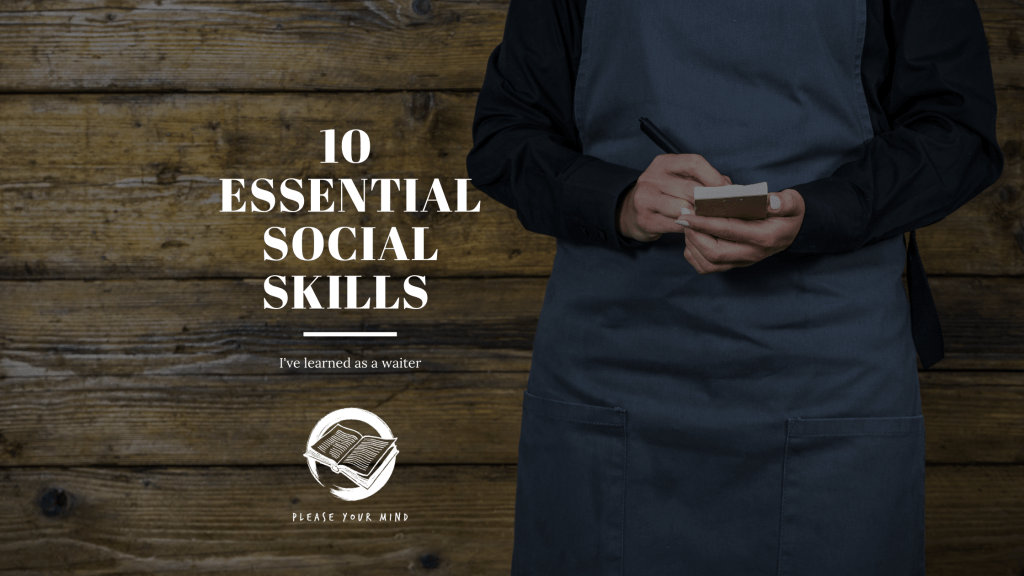I’ve been a waiter for almost 9 years now. No matter how I turn it. It’s an exhausting, underpaid, and ungrateful job. I always tried to escape this job but something called me back. This something is the social aspect of the job. In no other job, it’s so easy to meet many different kinds of people. By handling these guests I developed my social skills further. Over the 9 years, I found out 10 essential social skills you will develop for your future life.
#1 Smiling opens people’s hearts

A genuine, heartwarming smile sends you further than anything else. Just by smiling at a stranger, you created a base to work on. By smiling right, you show that you have no bad intentions. It can be done with talking as well. But you had to consider a lot of things. For example, the right words and tone, as well as your facial expression.
But smiling is the simplest and most powerful weapon in social skills. It opens people’s hearts, calms their behavior, and makes you more approachable.
Of course, you have to find the right smile. Smiling too intense will be seen as fake. Smiling too little will be seen as “I-am-paid-to-do-that that”. My trick is I see my guests as long-lost friends. People you had a great time but lost contact with. This will bring a much more warmhearted smile.
#2 Talking loud and clear

In my youth, I struggled with a stutter. Because I talk faster than I think. That is why I trip over my words again and again. I also had a problem with the volume of my speaking. Sometimes, I spoke too softly which made me seem as shy. Sometimes, I spoke too loud which made me seem rude.
As a waiter, I learned to adjust my talking volume and speed to the surroundings. If the restaurant was empty I spoke normally and slowly. On a Saturday evening, I spoke louder and faster but without stuttering. Because the guest is mostly drunk.
Adjusting my talking speed and volume helped me a lot with many different kinds of people. For people who like to be on their own, I tend to talk quieter. Because I didn’t want to be a pushover. For more outgoing people, I speak louder and faster. Because these people tend to get to the point quickly, I adjust that.
#3 Genuinely developing a warming personality

Since quitting being a waiter, I appreciate that job even more. Because I realized who I became. Before I started that job I was loud and jumpy. I did things with obvious intention, people could tell. My personality seemed fake. Being nice also seemed as fake. Even though I didn’t tend to do that. Not everyone liked that.
During my first job as a waiter, I discovered that I wasn’t a warm person at all. Because I overdo most of the things. Overly smiling, being too nice, and talking too much. People thought I was doing that for the tip. Which I did.
So, I decided to change my approach. I did things with no expectations in mind. Suddenly, I saw things differently. My goal wasn’t to earn a lot of tips, it was to make people feel welcome. I smile with my heart and do things for the sake of my guests. And with time, my tips increased automatically.
#4 Respecting boundaries

Different people have different kinds of boundaries. Identifying and respecting each guest’s boundaries is one of the essential social skills I have learned. It is important to respect the boundaries of others. Because by overstepping it, people will become defensive. When they are defensive, they won’t open up to you.
Therefore, it is also significant to identify the boundaries. It’s easy when you observe more than you talk. While you listen and observe, you find many clues to how far you can go. What are they talking about? Is it about something serious like family or business? Then don’t even try to put yourself in. It backfires when you say: “Yeah, I miss my grandmother, too.” Especially when you aren’t in that conversation.
If they talk about something funny, it’s a green flag to go in. When male guests talk about their romantic adventures, I just say: “Damn! Respect!” and give him a fist bump. I decided to participate in this conversation because I just said positive things about it. Everyone loves social approval and praise.
#5 Talking to Strangers

In the beginning, talking to strangers is always a hurdle. I used to overthink this. What do I say? What happens when they come up with questions? It stressed me a lot. So, I just keep it simple. With simple greetings and basic waiter questions.
With time, I became much smoother. And I realized a small change in my surroundings. People are much nicer to me. Every time, I dealt with a person in the service branch, I was favored. I don’t have to wait in the queue long nor are they rude. Also, they showed more patience towards me.
One person told me that I was easy to approach. My vibe and my body language make them ease up a lot. Some asked: “Do you work in customer service?” I agreed and was surprised. They could tell I was a waiter.
#6 Dealing with criticism and how to apologize

There are times when being a waiter is hard. When you forget an order or the kitchen messes up, it is crucial to deal with it. What I found out is that people, guests and chefs alike, hate excuses. When your apologies consist of excuses, chances are high that they don’t like you. Because it makes you seem weak and irresponsible. Who would trust you? Noone. Relationships are built on trust.
One of my colleagues had two gorgeous women at his table. But he fucked up completely. When I gave them their drinks, they asked if they could go to my station because it was warmer. I agreed. After giving them their food, I checked on them. “If everything to your satisfaction?” They said they aren’t happy here. Instead of using excuses like the restaurant is full or the kitchen chef is new, I just apologized deeply. In addition, I made this apology like it was entirely my fault. “I am deeply sorry for your experience. Can you tell what went wrong?“
They took a deep breath and started to count everything that went wrong. My colleague greeted them unfriendly and the steak was burnt. I again apologize in the name of the restaurant. Here again, I didn’t use any excuses. Instead, I listened calmly but attentively and offered a solution right away. “We will redo the steaks. In the meantime, you can choose a long drink for free. They were happy and I brought their drinks. Soon after I gave them new steaks, I said: “I will not leave until you are satisfied with your steak.” They laughed and took one bite. They smiled and were happy.
Later that night, one of them went up to me, gave me a 10€ tip, and said: “Thank you for saving our evening. You are the best”
#7 Becoming a Conversationalist

While working as a waiter, I developed ways to talk about anything. I can always figure out topics to talk about. Here are some ways to find topics:
- Current events
- Their professions and hobbies
- Ask about their opinion of X
- Followup questions. “You said your brother lives in the US? How is it there?”
The secret is to listen carefully and let them talk most of the time. You just ask questions. But only questions which answer you are really curious about. People love to talk.
#8 Changing the vibe

In many ways, changing the vibe or mood of a group has benefits. When you actively change their vibe, you will stand out positively. It’s easy when you just change topics. For example, I joked with a couple after they had a small fight. Instead of arguing the whole evening, they had a good time at the restaurant.
I used this skill a lot. It always brings me an invitation to weekly social events. People want to meet bright personalities.
#9 Basic Selling Skills

By selling food, I learned a lot about human desire. Finding out what they want, gives you a clear understanding of how to deal with people.
In my last job, I was known as the tomahawk guy. The tomahawk steak is the most expensive steak on the menu. In one day, I sold 5 pieces to different kinds of people. I sold it often to a group of big guys who wanted to show off. Or families who just want to experience new things. Or big groups of business guys who want to eat well.
Learning how to sell as early as possible is important. Not only does it make a good profit but also it makes you understand a human’s desire. What do people want in their life? What are their motives and reasons for doing things? If you know this, it is easier to handle those people. You also know how to talk to them and how you should behave.
#10 Controlling your negative emotions for future benefits

Millionaires, doctors, teachers, bricklayers, unemployed, I served them all. Many of them were quite friendly. Others were frickin rude. But no matter who I have dealt with, I always stayed professional. I had to even when it was hard. Especially when I was insulted. It was hard to keep a straight face. But I learned a lot from staying calm than getting angry.
First, treating people with respect even when they are rude to you helps in the long run. Because people will always open up to you. When they see how calmly I handle situations, it leaves a good impact. Not only for the guests but for my chefs as well. Instead, if I got angry, I would make the situation worse. And no one could benefit from it. I would be pissed, my guests and certainly my boss.
Second, hiding your negative emotions always gives you an advantage. It gave the other no chance to attack you verbally. How? If they know nothing about you? And it makes it much harder to predict your next move.
Third, not letting the situation escalate, gives you room to fix problems. Many things are repaired after a calm conversation rather than a heated fight.

